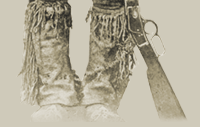 |

Student Process Guide
Choose one of the historical documents from the Mavericks: An
Incorrigible History of Alberta website. Read any information
about the document and examine it. Answer some or all of the following
questions as they apply to each document. Complete your work in
a journal format, and add any other information or questions that
may not be included in this guide.
A historical document can tell historians a great deal about what
is was truly like to live in a certain time. Letters, diaries, and
journals tell a great deal about the writer, providing personal
insight into how they viewed their lives, yet may also leave out
important information. Hunt for details that offer extra information
about the writer of the document, and make sure you ask questions
about the document you are investigating.
1. Type of Document
- What kind of document is it? (A letter, speech, press release,
report, advertisement, telegram, newspaper, or something else?)
- Are there any unique physical qualities to the document? (Exciting
letterhead? Handwritten? Stamps? Other markings?)
- When was the document written?
- Where was it written?
2. The Author and the Audience
- Who is the author(s) or creator(s) of the document?
- Who are they? Do they have a specific position or title?
- What authority does the author(s) have to write about this topic?
- Is there a bias in the authorđs writing toward a certain viewpoint?
Do they have a specific opinion on the topic? What might have
influenced their point of view?
- Who was the intended audience(s)? Who was supposed to read or
hear it?
- How might the audience(s) have reacted to the content of the
text?
3. Content
- What is the content of the document about? What is the topic
of the written text?
- What are the main points of the document?
- Does the author provide evidence to back up what they are saying
in the document?
- What story does it tell us about life at the time and how they
lived?
4. Context and Purpose
- Was it written for a specific occasion?
- What events or things going on at the time might have affected
the writing of the document?
- What is the purpose of the document? Why was it written in the
first place?
- Did the author(s) have an ˙unspoken" or ˙hidden" agenda in writing
the document?
- Would someone gain an advantage from this document? Does it
help them in some way?
- Would someone be harmed by the content of this document? How?
5. Importance
- Why do you think this document was written?
- What is important about this document? Why examine it?
- What have you learned from analyzing this document?
- Why is what we learn about the past from this document important?
6. Interpretation/Conclusions
- What does the document tell us about the values, ethics, and
difficulties of the writer(s)?
- What does the document tell us about the life of the writer(s)?
- What questions do you still have about the document, its writer,
or its audience?

 |



![]()

